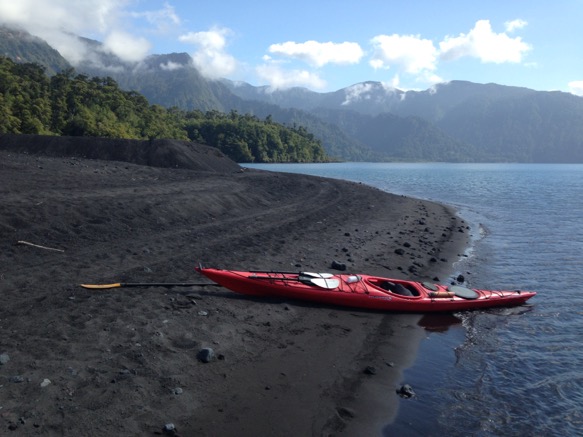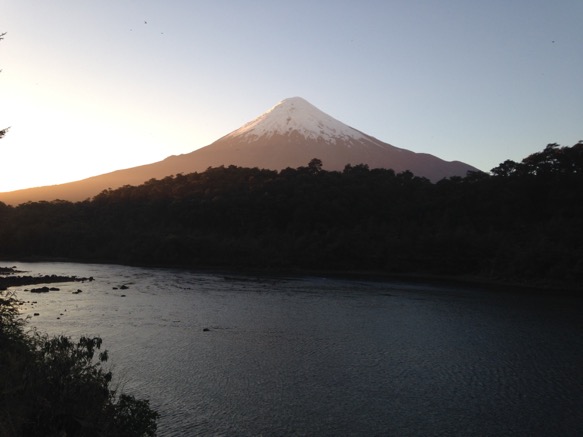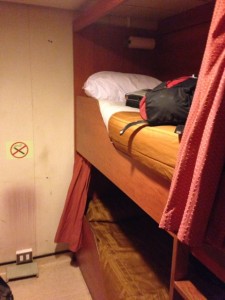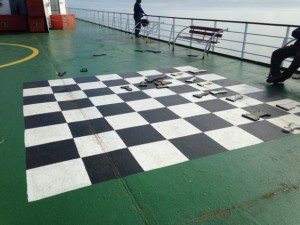
Leaving Puyuhuapi
Friday was a strange day; almost nothing went the way I expected. The group left Puyuhuapi around seven, but we quickly separated. This is normal; groups don’t usually travel in a pack so much as they cover the same ground at around the same time, but they go half an hour or an hour at their own speeds and then whoever’s ahead stops to wait for the others.
I was ahead. I stopped when I got to a place where the road was down to one lane because of construction, so they had to let traffic through in shifts, one direction at a time. I waited for several shifts and then started to worry. Where were they? Was one of them having problems with their bicycle? Had they somehow passed me without me realizing it? They hadn’t been that far behind me. I started to ask the waiting drivers if they had passed three cyclists, and if so, how long ago, but none of them had seen anyone. Was I going insane?
I waited an hour and a half and then finally gave up. They must have gone back; something must have happened. The next time our lane opened, I went through to the evil road.
The first part of the road was truly evil. It was narrow and full of construction workers and machines; a motorcycle got stuck and held up traffic for several minutes until some guys went over to help him. I walked part of the route, not because it was steep but because it was rocky.
As I went on, the traffic thinned out completely. On either side of the pass, they close the road from 1 to 5pm, so after about 1:30, all the cars had gone through and I was the only person on the road.
It was awesome. The road was a struggle — hours of uphill twists and turns, some over ridable dirt but some over impossible rocks — but the views were stunning.


I did start to run out of water, so that was a problem. It was afternoon and hot and I needed to find something. The water in Chile is all safe to drink, and there were several waterfalls, but the problem was access — they were all too far from the road. Finally I came to a spot where I could reach the falling water to fill my bottles, but only by taking my shoes off and stepping into the small pool of water below.

I got to the second cut off point around 3:30pm, so I had an hour and a half to wait. The cyclist trio showed up at 4:30.
I was super happy to see them. They told me they had stopped to go on a short hike, and that’s why nobody had seen them on the road. I thought that was a little strange, as they had never mentioned this plan, but whatever.
Half an hour later, we were headed downhill, which was in some ways just as awful as the climb, or at least differently awful. You basically have to use the brakes the entire way down, and the road is rocky, so bad in places I wound up walking, and it goes on forever, and my hands were killing me by the end, but I didn’t care because there was PAVEMENT! Blessed pavement! I don’t care what Brian and Amy say; pavement is heaven — and the road is paved from here all the way to my ferry ride.
Not only that, but pavement meant we had reached the end of our planned route, and it was time to look for a campsite. We had done it! We had made it across the mountain pass! Now it was time to rest and make dinner and drink wine!
Or not. We talked briefly, agreeing, I thought, to stop at the first suitable campsite, and then we started peddling.
I was not in front this time, and I was hurting. And hungry. We kept passing spots that looked perfect — flat, a ways from the road, close to water — but no one ever stopped. I became increasingly frustrated and increasingly crabby. What the hell were they doing? What cruel trick was this? The next actual town was twenty or thirty miles away, and we had already been on the road for twelve hours!
I tried to talk to one of the guys when I caught up with him, but the girl in the group was so far ahead by that point that the conversation was useless; even if I convinced him, we would still have to catch up with her. Plus, he said, they wanted a shower.
A shower?! I thought. We’re in the middle of nowhere! I was angry at their insanity and their complete lack of communication, and exhausted past the point of emotional resilience. Eventually I had to pull over and cry a little, and then I let them go. I put on my favorite music and sang along as I pushed myself forward, this time looking for a campsite for one.
Of course there was nothing. The road had veered away from the path of the river, and the land was all fenced off, but I didn’t see any houses or other signs of actual humans I could talk to, and I wasn’t brave enough to try squatting on my own.
And then, after a couple of miles, I saw it: a house! Oh my god, with people! I could see them; they were walking outside! I biked over and asked if I could please just pitch my tent in some corner of their yard and sleep.
Of course, they said. Then they invited me inside and offered me food and use of their bathroom. It was amazing. I was filthy and exhausted and ready to pass out in my clothes after eating nothing more than a hot dog bun, so a shower and an actual meal pretty much felt like a miracle.
It turned out I was not the first person to turn up on their doorstep; they get so many visitors they are planning to set up their own campsite over the next year or two. There’s just nothing around here, they said — nowhere to even buy bread.
I have no idea what happened to the trio of cyclists; I can only assume they kept going to the next town. It doesn’t seem humanly possible, but then again, neither does skipping breakfast, which they did, or not having lunch until they got through the mountain pass at 4:30, which they also did. Maybe they’re robots.
One of them had warned me the night before that they were amateurs and not professionals like me. Surprised, I laughed and said if I was faster than anyone, it was only because of my 29-inch wheels. And he said no, I mean like planning everything.
I’m still not quite sure what that means, but it does seem that perhaps we were not the most compatible of traveling companions.
They didn’t even laugh at my jokes.

























